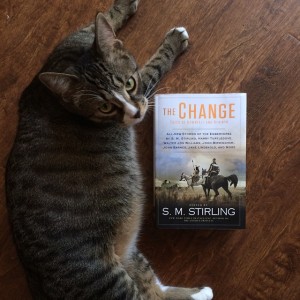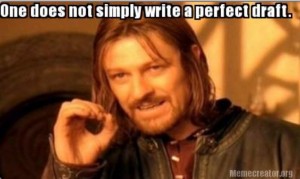
If you happened to be outside my front window right now, this is what you would see. (Please don’t step on my flowers while you are there, you mad stalker! I actually got some bulbs going that the squirrels have so far neglected to eat.)
My birch trees are busting out fine new leaves, perfect little chlorophyll-laden shapes, with edges like serrated knives, and I have been writing Novel Writing III critiques about a meter from the bird feeder, which is exceedingly popular with the local sparrows.
Yesterday tasted of summer. It was bright and sunny and the house got a little bit stuffy. You could walk outside in a dress. No tights, no coat required. Kelly and I strolled out through a cherry blossom-infested U of T campus to Bloor Street, and a matinee of the film adaptation of Far from the Madding Crowd . This was a speed version of Thomas Hardy. Look, a girl! Look, a boy! Another boy! A third boy! Unhappiness! Misery! Woe! Boom! Conveniently, we’re now back to one available party representing each of the sexes. Someone read the damned banns already.
. This was a speed version of Thomas Hardy. Look, a girl! Look, a boy! Another boy! A third boy! Unhappiness! Misery! Woe! Boom! Conveniently, we’re now back to one available party representing each of the sexes. Someone read the damned banns already.
To sum up my emotional reaction to this particular costume drama: the horses were pretty and nobody got hanged.
We came home, waited for it to cloud over, and climbed into the hot tub. This enabled me, later, to phone Vancouver, say “Thank you for giving me life!” and proceed to brag about how awesome a day it had been.
Today it is cooler and foggy.
I have a schtick on Facebook whereby I’ll often give the cats (whom we adopted 358 days ago, I’ll have you know) super-sekrit spy names for the day. Moose and Squirrel. Joe Dick and Billy Talent. Laundry Chicken and What’s Going On? Today it was Johnny Fever and Venus Flytrap, which has spawned a small conversation about whether anyone could successfully reboot WKRP In Cincinnati and, if so, how? My position is that it would have to start exactly like the Battlestar Galactica reboot: Earth gets nuked, but Cincinatti survives. For obscure reasons (one friend claims this would be Johnny’s paranoia in action) the radio station was shielded against EMP.
and, if so, how? My position is that it would have to start exactly like the Battlestar Galactica reboot: Earth gets nuked, but Cincinatti survives. For obscure reasons (one friend claims this would be Johnny’s paranoia in action) the radio station was shielded against EMP.
Red Wigglers the size of Cadillacs would be roaming the Midwest, which makes it all seem like a mash-up with Dune.
Continuing on with the random, I am pondering a few fine linguistic details within the Stormwrack universe. A few of these came up when I was reviewing the copy-edit of A Daughter of No Nation . I got a query about when I use “in Fleet” as opposed to when I use “the Fleet.” (Answer: ‘in Fleet’ when they mean the city, and the words ‘in Tacoma’ could be used just as correctly. ‘The Fleet’ when we’re talking about the subsection that is a navy: “We’ll be sending the Fleet around to see if you’re in compliance with the Treaty.”) I had been doing this correctly but without conscious thought.
. I got a query about when I use “in Fleet” as opposed to when I use “the Fleet.” (Answer: ‘in Fleet’ when they mean the city, and the words ‘in Tacoma’ could be used just as correctly. ‘The Fleet’ when we’re talking about the subsection that is a navy: “We’ll be sending the Fleet around to see if you’re in compliance with the Treaty.”) I had been doing this correctly but without conscious thought.
And here’s something that doesn’t happen to literary writers all that often: I had already known that the portions of the Hidden Sea Tales that take place on Stormwrack (as opposed to in San Francisco) were playing out, linguistically, in Fleetspeak. This means that those scenes played out in Fleet and were translated, by me, into present-day English. This is something that’s essentially invisible to everyone but my wacky imagination, but it became something of an entertaining conceit through the copy-edit process.
See, I’m no Tolkien. (I know, you’re shocked.) I don’t actually speak Fleetspeak. And the poor copy-editor really doesn’t speak Fleetspeak. So there was a bit of them going “Here’s a foreign word,” and me going, “No, that’s actually a real English science word. I had to look it up, too.” And them going “Here’s another foreign word ,” and me going, “It’s not foreign in Fleetspeak.”
Them: “Here’s another another foreign word.
Me: “Yes, that one’s Erinthian. Obvs. We can italicize that.”
None of which actually happened face to face, you understand. I’m describing a process of me talking to pencil marks on a 600-page manuscript that is now, blessedly, wrapped, taped, bar-coded and in the hands of Canada Post.
The c/e did a meticulous, thoughtful job and I’m so fucking grateful you can’t even imagine.
Finally, I am groping for a verb I can noun (or a noun I can verb) to describe a particular element of the magical inscription process, whereby a spellscribe takes an existing spell and creates a variation on it. I played with embroidering, but it’s long and unwieldy and not quite right. The embroidered spell? A broidery?
The closest equivalent to the variation/embroidery process would be someone taking a fiddly gourmet recipe and creating an undeniably different–but recognizably similar–food. Going from curried plantains in coconut milk to… maybe something with green mangos?
Why am I not currying plantains tonight? Why am I not currying plantains right now?
 I have a post up on Tor.com called “Where to Start with Connie Willis.” The title’s self-explanatory, and there’s a lively conversation in the comments thread about how communications technology does or doesn’t fit into her work, and whether the age of the smartphone has left Willis’s main body of work looking somewhat dated… and also, of course, how much that may or may not matter.
I have a post up on Tor.com called “Where to Start with Connie Willis.” The title’s self-explanatory, and there’s a lively conversation in the comments thread about how communications technology does or doesn’t fit into her work, and whether the age of the smartphone has left Willis’s main body of work looking somewhat dated… and also, of course, how much that may or may not matter. is on the Sunburst Award Honorable Mention list, in the YA category. Peter Darbyshire of The Province has a write-up on some of short list folks from B.C. here.












